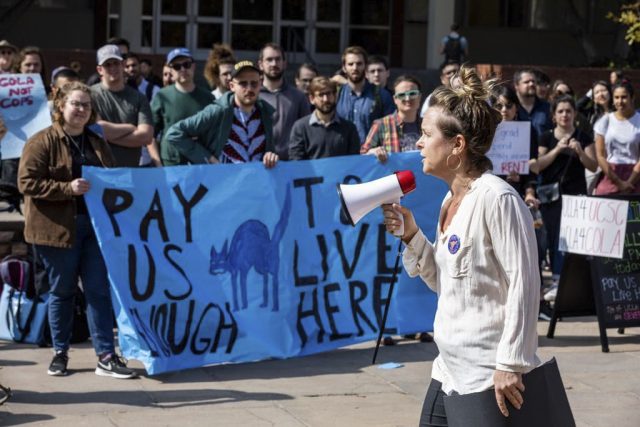UC Santa Cruz announced Monday that it will provide all Master of Fine Arts and doctoral students with a retroactive housing supplement following strikes at the Santa Cruz campus over the last few weeks.
UCSC MFA and Ph.D. students will receive a $2,500 supplement for the 2019-2020 year, as long as teaching assistants resume their duties and submit fall grades.
Graduate students at UCSC first went on strike in December and refused to provide fall grades in order to obtain a cost-of-living adjustment. Students went on strike again starting Feb. 10 and refused to teach, grade or hold office hours.
UCLA graduate students rallied in solidarity with UCSC graduate students Wednesday and also expressed concerns over the high cost of living in Westwood, which is the most expensive ZIP code in California.
UCSC originally planned to make the housing supplement needs-based, but ultimately decided to give the supplement to all full-time MFA students in their first two years and Ph.D. students in their first five years, said Lori Kletzer, interim campus provost and executive vice chancellor of UCSC, in a statement.
“We heard concerns that making the $2,500 housing supplement ‘needs-based’ would disqualify many from eligibility, particularly international students,” Kletzer said.
Kletzer added she is grateful for the honest conversations she has had with the UCSC community throughout the process.
“My hope is that this message provides clarification and assurance of next steps,” Kletzer said in the statement. “The opportunities described here are intended to help bring our campus community back to its teaching, learning, and research mission.”
While the housing supplement is a step forward, it is not enough, said Kavitha Iyengar, president of United Auto Workers Local 2865, which represents about 19,000 University of California student workers, in a press release.
Since the change did not occur under a union contract, it is not legally enforceable, Iyengar said in the statement. Additionally, she added the supplement only applies to students at UCSC.
“As our framework for a COLA demonstrates, workers at every single campus are rent burdened and need this relief,” Iyengar said in the release.
Even with the supplement, students are still burdened by rent, Iyengar said.
“We are making progress – but we’re not done yet,” she said. “We have been asking UC to bargain with us on this issue for over a month.”
UAW Local 2865 asked the UC to bargain Jan. 15 but it refused, according to the press release.
UC President Janet Napolitano announced Friday in a press release that she had invited the UC Graduate and Professional Council to meet to discuss student concerns. UCGPC agreed to meet with the UC Office of the President to discuss advocacy opportunities but stated it will not negotiate contracts.
“That is unacceptable – the UAW is the only legally authorized collective bargaining organization for graduate student-workers and the university knows it,” Iyengar said in a press release. “We will continue to organize and advocate for additional compensation and a #COLA4all until no student worker at UC is rent burdened.”

